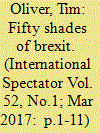| Srl | Item |
| 1 |
ID:
152539


|
|
|
|
|
| Summary/Abstract |
Britain’s vote to leave the EU has raised more questions than answers, which is ironic given that David Cameron’s aim for the referendum was to settle the European question in British politics. The outcome, which reflected a range of causes, leaves significant uncertainties overhanging UK politics, UK-EU relations and wider European politics. It is likely that the confused outcome of the referendum and the technicalities of Brexit mean that for both the UK and the EU future relations will resemble fifty shades of grey rather than some black and white division of in or out.
|
|
|
|
|
|
|
|
|
|
|
|
|
|
|
|
| 2 |
ID:
145285


|
|
|
|
|
| Summary/Abstract |
A British exit from the EU would add to growing strains on the United States’ relations with Britain and the rest of Europe, but by itself would not lead to a breakdown in transatlantic relations due to the scale of shared ideas and interests, institutional links, international pressures and commitments by individual leaders. It would, however, add to pressures on the US that could change the direction of the transatlantic relationship. From the perspective of Washington, Britain risks becoming an awkward inbetweener, beholden more than ever before to a wider transatlantic relationship where the US and EU are navigating the challenges of an emerging multipolar world. The article outlines developments in the UK, EU, Europe and the US in order to explain what Brexit could mean for the United States’ approaches to transatlantic relations. By doing so the article moves beyond a narrow view of Brexit and transatlantic relations that focuses on the future of UK–US relations. In the conclusion we map out several ways in which US views of the transatlantic relationship could be changed.
|
|
|
|
|
|
|
|
|
|
|
|
|
|
|
|
| 3 |
ID:
138338


|
|
|
|
|
| Summary/Abstract |
The idea of holding an in/out referendum on Britain's membership of the European Union has increasingly become a norm of British politics, an act seen as a necessary step for the country to answer what David Cameron described as the ‘European question in British politics’. A referendum, it is hoped, will cleanse British politics of a poisonous debate about Europe and democratically sanction a new stable UK–EU relationship, whether the UK stays in or leaves. Such hopes expect more of a referendum than it can provide. The European question is a multifaceted one and whatever the result of a referendum it is unlikely to address underlying questions that will continue to cause problems for UK–EU relations and Britain's European debate. A referendum can be a step forward in better managing the relationship and debate, but it is only that: a single step, after which further steps will be needed. Coming to terms with the European question and bringing stability to Britain's relations with the EU—whether in or outside the EU—will require comprehensive, longer-term changes which a referendum can help trigger but in no way guarantee.
|
|
|
|
|
|
|
|
|
|
|
|
|
|
|
|